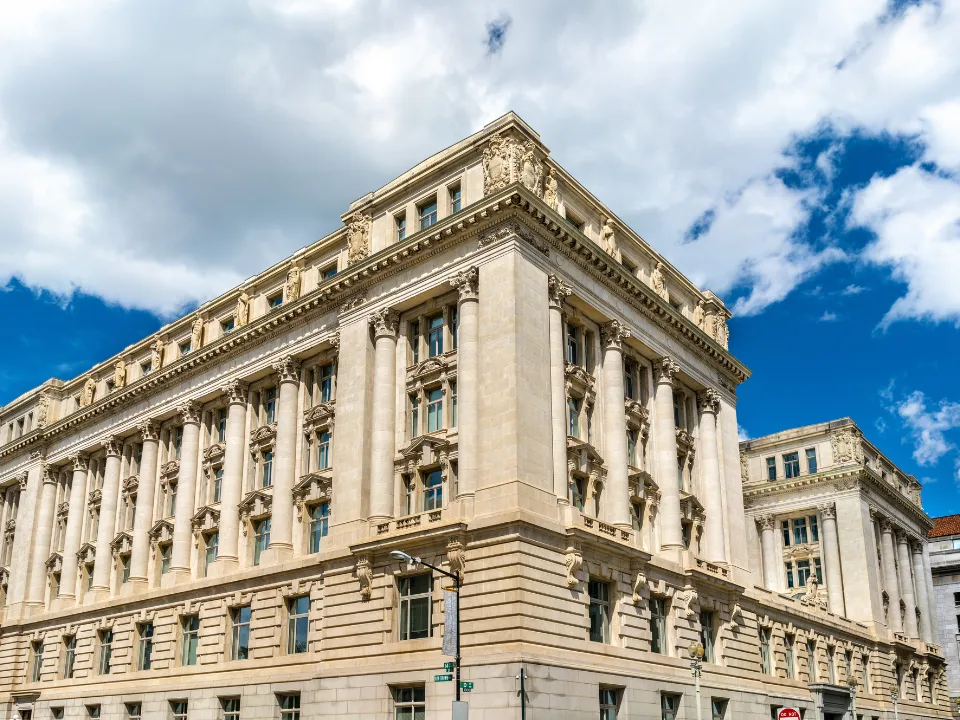- The Trump administration is contemplating the sale of two-thirds of the government’s offices, including 70 MSF leased by the GSA in DC.
- This push to streamline government real estate could pressure local landlords, many of whom rely on the GSA as an anchor tenant.
- The GSA, which owns and manages a vast portfolio of federal buildings, is struggling with underused, poorly maintained properties with high vacancies.
The Trump administration is considering selling two-thirds of the government’s office stock, a move that could reshape Washington’s real estate market and leave landlords reeling, according to WSJ.
A Changing Relationship
President Trump’s relationship with the General Services Administration (GSA) has had its ups and downs.
Before his first term as president, Trump was awarded the lease to redevelop the Old Post Office in DC into the Trump International Hotel, a successful project that earned him praise from the agency. During the hotel’s 2016 grand opening, Trump even called GSA officials “amazing professionals.”
However, tensions flared following Trump’s clashes with the GSA during the investigation into Russian election interference. By the time he was elected in 2016, his feelings toward the agency had soured, and in the years that followed, his administration began reevaluating its real estate holdings.
A Deeper Look
The Trump administration is now pushing to reduce the federal government’s real estate footprint, with plans to sell off two-thirds of the government’s office stock, including significant portions of the 70 MSF the GSA leases in DC.
This would be a sizeable, seismic shift, as the GSA is one of the capital’s largest tenants. According to industry insiders, a considerable portion of the GSA’s leased space—up to 75%—could be canceled.
This is all happening in the wake of rising vacancies across the federal government’s real estate holdings, many of which are underused or in disrepair. During a 2023 testimony before Congress, the GSA admitted that numerous buildings are sitting empty, underfunded, or deteriorating.
Get Smarter about what matters in CRE
Stay ahead of trends in commercial real estate with CRE Daily – the free newsletter delivering everything you need to start your day in just 5-minutes
Potential Market Shakeup
The potential sale could have big implications for DC’s office market. The GSA’s decision to sell properties and cancel leases could put pressure on landlords, particularly those who rely heavily on government leases to fill their buildings.
Real estate expert Don Peebles predicts that some of the GSA’s assets could sell at steep discounts (“30 cents on the dollar”), potentially dragging down the value of nearby office buildings already struggling due to declining demand.
While the GSA’s moves are part of an effort to right-size and optimize the federal portfolio, industry observers are concerned that selling off properties could flood the market with vacant buildings, further destabilizing the office sector in DC.
Wrinkles in the Plan
The GSA’s plan to unload federal properties won’t be simple. Before auctioning buildings, the agency must first offer them to other government entities at no cost or reduced prices, a process that could delay sales. The GSA is also dealing with a vast inventory of aging buildings, many of which are not in marketable condition.
Some, like the 1 MSF GSA regional headquarters in L’Enfant Plaza, have been empty since 2018. While the location is prime, the building needs approximately $185M in renovations—an investment few are eager to make. This is a major issue as many of the GSA’s assets are from the 1970s and lack proper maintenance.
The Bigger Picture
The federal government’s real estate portfolio has long been a target for efficiency cuts. The GSA, established in 1949, was originally tasked with streamlining government operations and cutting waste.
While its role has evolved to managing real estate, it still operates with a focus on saving taxpayer money. However, its current struggle to manage the government’s vast property holdings suggests that even the GSA’s historical mission to optimize government operations has limits.
Some experts believe the government simply isn’t good at managing large-scale real estate portfolios. Darrell Crate, CEO of Easterly Government Properties, points out that many of these buildings are costly to maintain and often underutilized.
He likens the situation to Trump’s Mar-a-Lago property, which the government once struggled to manage but that Trump turned around into a successful resort and private club.
What’s at Stake
The potential sale of government properties could reshape Washington’s office real estate landscape. Many buildings in the city are already struggling with low occupancy rates, exacerbated by the shift to remote work.
Notably, a recent report from Sen. Joni Ernst revealed no major government agency’s HQ in DC is more than half full, with GSA-owned buildings averaging a 12% occupancy rate. This leaves federal landlords with thousands of vacant or underused properties to manage.
If the GSA moves forward with its sales, the impact on the DC office market could be profound—and reverberate across the country. Canceling that many federal leases and disposing of so many federal properties could lead to lower property values and create challenges for private-sector landlords.


















